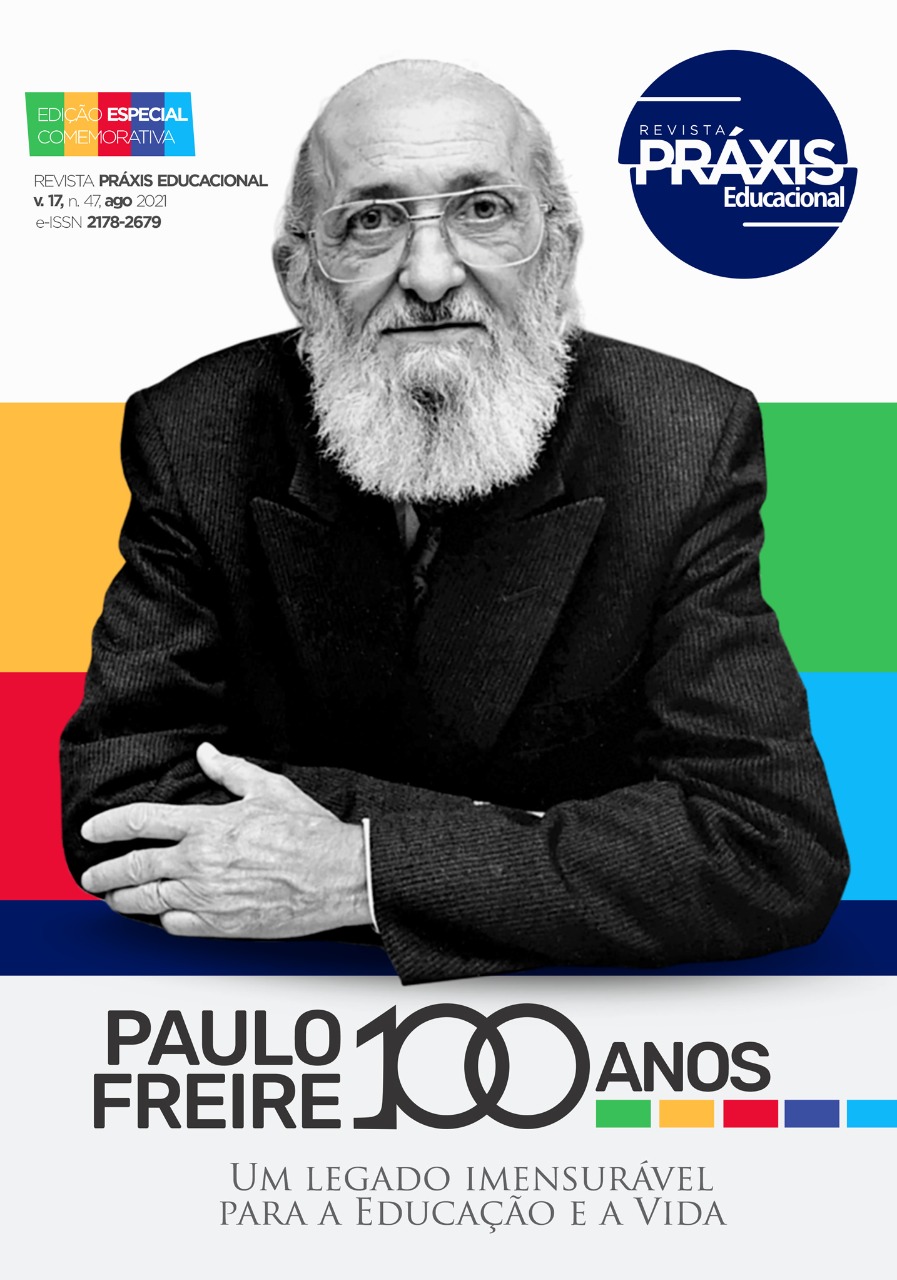Paulo Freire e o combate ao analfabetismo na Guiné-Bissau: a campanha nacional de alfabetização e educação de adultos
DOI:
https://doi.org/10.22481/praxisedu.v17i47.9480Palavras-chave:
Paulo Freire, Educação e Alfabetização de Adultos, Guiné-BissauResumo
O presente artigo foi elaborado no quadro das comemorações do centenário de Paulo Freire, grande educador brasileiro cujas contribuições vão para além do Brasil, chegando em vários países do continente africano entre eles a Guiné-Bissau. Neste país, Freire teve uma participação ativa na organização da nova educação almejada pelo país após a conquista da independência, notadamente na organização e execução da Campanha Nacional da Educação e Alfabetização de Adultos, uma das armas empreendidas na luta pela erradicação do analfabetismo. Trata-se de uma pesquisa de caráter qualitativo, tipo estudo de caso, descritivo, em que se observou, se registrou e se analisou essa contribuição. Constatou-se que apesar do grande empenho de Freire nessa campanha, a mesma não atingiu todas as expectativas pelo fato de entre outros não se ter uma língua de ensino apropriada para que a população tivesse condições de se apropriarem do saber; os conflitos político militares que assolaram o país, entre outros. Mesmo assim salienta-se que esta obra educacional deve ter continuidade por ser uma radialista, baseadas no encontro com o povo através do diálogo, enquanto instrumento metodológico que permite a leitura crítica da realidade, partindo da linguagem do povo, uma ferramenta de luta pela libertação dos oprimidos, um método de educação que valoriza o saber do povo e suas realidades culturais na construção de novos saberes emancipatórios.
Downloads
Metrics
Referências
ALMEIDA, Hilda Maria Ferreira. Educação e transformação social: formas alternativas de educação em país descolonizado. 1981. 239 p. Tese (Mestrado em Educação) -Fundação Getúlio Vargas, Rio de Janeiro, 1981.
CABRAL, A. PAIGC: unidade e luta Lisboa: Nova Aurora, 1974.
FREIRE, P. Educação como prática da liberdade. Rio de Janeiro: Paz & Terra, 1974.
______. Pedagogia do oprimido. Porto: Afrontamento, 1975.
______. A mensagem de Paulo Freire: textos de Paulo Freire selecionados pelo INODEP. São Paulo: Nova crítica, 1977.
______. Pedagogia do oprimido. 17. ed. Rio de Janeiro: Paz & Terra, 1978.
______. Pedagogia da autonomia: saberes necessários à prática educativa. São Paulo: Paz e Terra, 1996.
FURTADO, Alexandre Brito Ribeiro. Administração e gestão da educação na Guiné-Bissau: incoerências e descontinuidades. 2005. 702 p. Dissertação (Doutorado em Ciências da Educação) -Universidade de Aveiro, Aveiro, 2005.
MACEDO, Francisco de. A Educação na República da Guiné-Bissau – O Passado as transformações no presente, as perspectivas do futuro. Braga: Editorial Franciscana, 1978.
NAMONE, Dabana. A luta pela independência na Guiné-Bissau e os caminhos do projeto educativo do PAIGC: etnicidade como problema na construção de uma identidade nacional. 2014. 120 p. Dissertação (Mestrado em Ciências Sociais) -Universidade Estadual Paulista Júlio de Mesquita Filho, Araraquara, 2014.
PEREIRA, Aristides. Relatório do C.S.L ao III Congresso do PAICG: Resolução Geral Estatutos, a Direção Eleita. Bolama: Imprensa Nacional, 1977.
SANÉ, Samba. A Educação na Guiné-Bissau: Perspectivas na atualidade. O ensino básico em questão. 2019. 330 p. Dissertação (Doutorado em Educação) – Uiniversidade Federal de Santa Maia, Santa Maria, 2019.
VARELA, Bartolomeu Lopes. A educação, o conhecimento e a cultura na práxis de libertação nacional de Amílcar Cabral. Praia: [S.n.], 2012. Disponível em: https://www.academia.edu/1308254/A_educa%C3%A7%C3%A3o_o_conhecimento_e_a_cul tura_na_pr%C3%A1xis_de_liberta%C3%A7%C3%A3o_nacional_de_Am%C3%ADlcar_Ca bral. Acesso em: 20 set. 2018.
Downloads
Publicado
Como Citar
Edição
Seção
Licença

Este trabalho está licenciado sob uma licença Creative Commons Attribution-ShareAlike 4.0 International License.
Você é livre para:
Compartilhar - copia e redistribui o material em qualquer meio ou formato; Adapte - remixe, transforme e construa a partir do material para qualquer propósito, mesmo comercialmente. Esta licença é aceitável para Obras Culturais Livres. O licenciante não pode revogar essas liberdades, desde que você siga os termos da licença.
Sob os seguintes termos:
Atribuição - você deve dar o crédito apropriado, fornecer um link para a licença e indicar se alguma alteração foi feita. Você pode fazer isso de qualquer maneira razoável, mas não de uma forma que sugira que você ou seu uso seja aprovado pelo licenciante.
Não há restrições adicionais - Você não pode aplicar termos legais ou medidas tecnológicas que restrinjam legalmente outros para fazer qualquer uso permitido pela licença.










